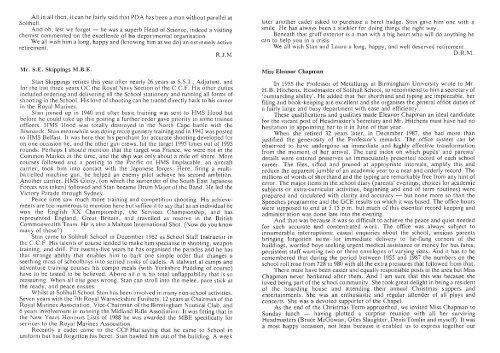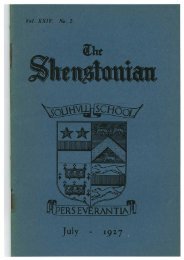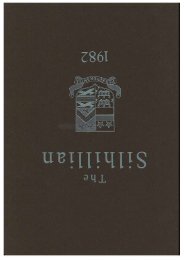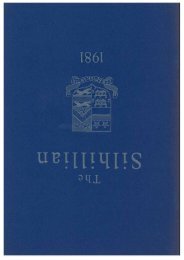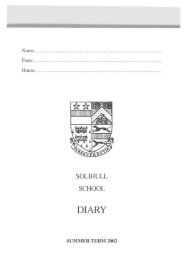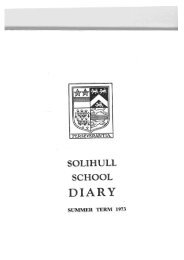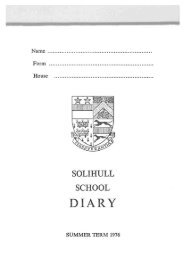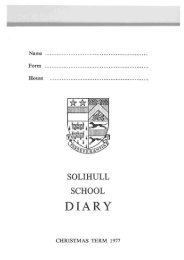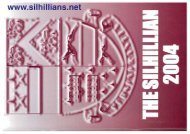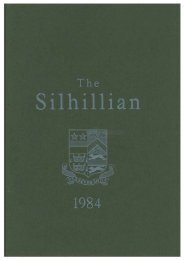SHENSTON IAN 88 - Old Silhillians Association
SHENSTON IAN 88 - Old Silhillians Association
SHENSTON IAN 88 - Old Silhillians Association
You also want an ePaper? Increase the reach of your titles
YUMPU automatically turns print PDFs into web optimized ePapers that Google loves.
All in all then, it can be fairly said that PDA has been a man without parallel at<br />
Solihull.<br />
And oh, lest we forget — he was a superb Head of Science, indeed a visiting<br />
chemist commented on the excellence of his departmental organisation.<br />
We all wish him a long, happy and (knowing him as we do) an extremely active<br />
retirement.<br />
R.J.M<br />
Mr. S.E. Skippings M.B.E.<br />
Stan Skippings retires this year after nearly 26 years as S.S.I., Adjutant, and<br />
for the last three years OC the Royal Navy Section of the C.C.F. His other duties<br />
included ordering and delivering all the School stationery and running all forms of<br />
shooting in the School. His love of shooting can be traced directly back to his career<br />
in the Royal Marines.<br />
Stan joined up in 1940 and after basic training was sent to HMS Hood but<br />
before he could take up this posting a further order gave priority to some trainee<br />
officers. HMS Hood was totally destroyed in the North Cape battle with the<br />
Bismarck. Stan meanwhile was doing more gunnery training and in 1942 was posted<br />
to HMS Belfast. It was here that his penchant for accurate shooting developed for<br />
on one occasion he, and the other gun crews, hit the target 1995 times out of 1995<br />
rounds. Perhaps I should mention that the target was France, we were not in the<br />
Common Market at the time, and the ship was only about a mile off shore. More<br />
courses followed and a posting to the Pacific on HMS Implacable, an aircraft<br />
carrier, took him into contact with the Japanese forces. Here, firing a multibarrelled<br />
machine gun, he helped an enemy pilot achieve his second ambition.<br />
Another carrier, HMS Glory, (on which the surrender of the South East Japanese<br />
Forces was taken) followed and Stan became Drum Major of the Band. He led the<br />
Victory Parade through Sydney.<br />
Peace time saw much more training and competition shooting. His achievements<br />
are too numerous to mention here but suffice it to say that as an individual he<br />
won the English XX Championship, the Services Championship, and has<br />
represented England, Great Britain, and travelled as reserve in the British<br />
Commonwealth Team. He is also a Maltese International Shot. (Now do you know<br />
many of those?) -<br />
Stan came to Solihull School in December 1962 as School Staff Instructor in<br />
the C.C.F. His talents of course tended to make him specialise in shooting, weapon<br />
training, and drill. For twenty-five years he has organised the parades and he has<br />
that strange ability that enables him to bark one simple order that changes a<br />
seething mass of schoolboys into serried ranks of cadets. A stalwart at camps and<br />
adventure training courses his compo meals (with Yorkshire Pudding of course)<br />
have to be tasted to be believed. Above all it is his total unflappability that is so<br />
reassuring. When all else goes wrong, Stan can stroll into the melee, pace stick at<br />
the ready, and peace ensues.<br />
Whilst at Solihull School Stan has been involved in many non-school activities.<br />
Seven years with the 7th Royal Warwickshire Fusiliers, 12 years as Chairman of the<br />
Royal Marines <strong>Association</strong>, Vice-Chairman of the Birmingham Nautical Club, and<br />
6 years involvement in running the Midland Rifle <strong>Association</strong>. It was fitting that in<br />
the New Years Honours Lists of 19<strong>88</strong> he was awarded the MBE specifically for<br />
services to the Royal Marines <strong>Association</strong>.<br />
Recently a cadet came to the CCF Hut saying that he came to School in<br />
uniform but had forgotten his beret. Stan bawled him out of the building. A week<br />
later another cadet asked to purchase a beret badge. Stan gave him one with a<br />
smile. He has always been a stickler for doing things the right way.<br />
Beneath that gruff exterior is a man with a big heart who will do anything he<br />
can to help you in a crisis.<br />
We all wish Stan and Laura a long, happy, and well deserved retirement.<br />
D.R.<br />
Miss Eleanor Chapman<br />
In 1955 the Professor of Metallurgy at Birmingham University wrote to Mr.<br />
H.B. Hitchens, Headmaster of Solihull School, to recommend to him a secretary of<br />
'outstanding ability'. He added that 'her shorthand and typing are impeccable, her<br />
filing and book-keeping are excellent and she organises the general office duties of<br />
a fairly large and busy department with ease and efficiency'.<br />
These qualifications and qualities made Eleanor Chapman an ideal candidate<br />
for the vacant post of Headmaster's Secretary and Mr. Hitchens must have had no<br />
hesitation in appointing her to it in June of that year.<br />
When she retired 32 years later, in December 1987, she had more than<br />
justified the generosity of the Professor's remarks. The office system can be<br />
observed to have undergone an immediate and highly effective transformation<br />
from the moment of her arrival. The card index on which pupils' and parents'<br />
details were entered preserves an immaculately presented record of each school<br />
career. The files, sifted and pruned at appropriate intervals, amplify this and<br />
reduce the apparent jumble of an academic year to a neat and orderly record. The<br />
millions of words of shorthand and the typing are remarkably free from any hint of<br />
error. The major items in the school diary (parents' evenings, choices for academic<br />
subjects or extra-curricular activities, beginning and end of term routines) were<br />
prepared and circulated with clarity and accuracy — but none more so than the<br />
Speeches programme and the GCE results on which it was based. The office hours<br />
were supposed to end at 5.15 p.m. but much of this essential record keeping and<br />
administration was done late into the evening.<br />
And that was because it was so difficult to achieve the peace and quiet needed<br />
for such accurate and concentrated work. The office was always subject to<br />
innumerable interruptions: casual enquiries about the school, anxious parents<br />
bringing forgotten items- for immediate delivery to far-flung corners of the<br />
buildings, worried boys seeking urgent medical assistance or money for bus fares,<br />
persistent staff wanting two or three envelopes of varying sizes. And it has to be<br />
remembered that during the period between 1955 and 1987 the numbers on the<br />
school roll rose from 728 to 980 with all the extra pressures that followed from that.<br />
There must have been easier and equally responsible posts in the area but Miss<br />
Chapman never hankered after them. And I am sure that this was because she<br />
loved being part of the school community. She took great delight in being a resident<br />
of the boarding house and attending their annual Christmas suppers and<br />
entertainments. She was an enthusiastic and regular attender of all plays and<br />
concerts. She was a devoted supporter of the Chapel.<br />
As the end of the Christmas Term approached, we invited Miss Chapman to<br />
Sunday lunch — having plotted a surprise reunion with all her surviving<br />
Headmasters (Bruce McGowan, Giles Slaughter, Denis Tomlin and myself). It was<br />
a most happy occasion, not least because it enabled us to express together our


